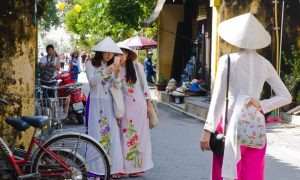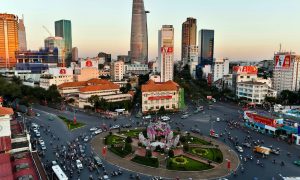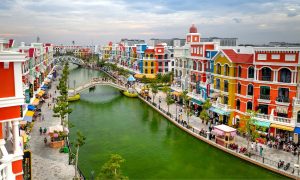As an emerging economy in Southeast Asia, Vietnam is attracting more and more expatriates who choose toimmigrantsor permanent residence. As aImmigration to Vietnampeople, it is vital to understand the local housing, education and healthcare systems. This will not only help you adapt to your new surroundings, but will also allow you to plan your life better. This article will give you a detailed overview ofImmigration to VietnamAfterward, what you need to know about housing, education, and healthcare.
1. Housing market in Viet Nam
In Vietnam, the real estate market has continued to boom in recent years in line with rapid economic development, especially in major cities such as Ho Chi Minh City, Hanoi and Da Nang. The influx of foreigners and investors has boosted demand for real estate, with many foreigners choosing to make their homes in these cities.
Housing options
Vietnam has a wide variety of housing options, including apartments, villas and detached houses. Foreigners in larger cities tend to choose high-end apartments or serviced apartments, which are often equipped with modern facilities and offer 24-hour security. In Ho Chi Minh City and Hanoi in particular, many foreigners choose to live in luxury apartments in the city center or in high-rise residences located in business districts.
For families, villas and row houses are also good choices. There are many family-friendly homes in Vietnam's suburbs and peri-urban areas, which are more affordable than in the city center.
Restrictions on the purchase of housing by foreigners
According to Vietnam's laws, foreigners cannot purchase a single residential unit that exceeds 10% of the building's total area. Therefore, if you plan to live or invest in real estate in Vietnam for a long period of time, it is important to choose the right housing. Foreigners are generally only allowed to purchase apartments, while the purchase of land or independent homes is usually severely restricted.
rental market
Renting is a more common option for most migrants. In major cities such as Ho Chi Minh City and Hanoi, the rental market is highly competitive. Rental prices vary depending on location, size of the house and type of housing. For example, high-end apartments in the city center area rent for around US$500 to US$1,500 per month, while apartments or houses in the suburbs rent for a relatively low amount.
2. Vietnam's education system
Vietnam's education system has also improved greatly in recent years. With the Vietnamese government's increased investment in the education sector, one of the reasons why many foreigners choose to settle in Vietnam is because of its more favorable educational environment.
international school
International schools are very popular in Vietnam's major cities, and these schools provide an internationalized education for expatriate students. International schools usually teach in English and use an international curriculum such as the American, British or International Baccalaureate (IB) programs. Ho Chi Minh City and Hanoi are home to a number of well-known international schools, such as the Vietnam International School, the British International School, and the American International School.

These schools have higher tuition fees, usually ranging from $8,000 to $25,000 per year, but they provide a high quality education and help expatriate children integrate smoothly into an international learning environment.
public school
In addition to international schools, public schools in Vietnam are improving. However, the language of instruction in public schools is predominantly Vietnamese, and adaptation may be difficult for foreign students who do not speak Vietnamese. Therefore, if your child does not speak Vietnamese, choosing an international school may be a more appropriate option.
higher education
Vietnam's higher education system is also becoming increasingly internationalized, with many Vietnamese universities partnering with world-renowned institutions to offer internationalized degree programs. If you plan to live in Vietnam for a long period of time, it may be an option for your children to continue their education at a local university.
3. Healthcare system in Viet Nam
Vietnam's healthcare system has improved significantly over the past few years, especially in the larger cities where the number and quality of hospitals and clinics continues to grow. It is important for expatriates to understand Vietnam's healthcare delivery system and how to access healthcare coverage.

Public and private hospitals
Public hospitals in Vietnam usually provide basic medical services at relatively low cost. However, due to the large number of people attending and the relatively tight medical resources, expats may have to spend more time waiting in line and dealing with language barriers. For expats who require a high level of medical care, private hospitals are more appropriate.
In major cities such as Ho Chi Minh City and Hanoi, there are many private hospitals and clinics for foreigners, such as the French Vietnam Hospital (FV Hospital) and the Singapore International Hospital (SIH). These hospitals usually provide high quality medical care and have healthcare staff who are fluent in English, making it easier for expatriates to communicate and seek treatment.
medical insurance
In Vietnam, expats have the option of purchasing either local health insurance or international health insurance. Vietnam's public health insurance system is primarily for its own citizens, but expats can choose to enroll in health insurance plans offered by private insurance companies. International insurance companies also offer insurance plans that are valid in Vietnam, ensuring that you have prompt access to quality medical care in the event of a sudden illness or accident.
Pharmaceuticals and medical equipment
Vietnam's pharmaceutical market is gradually developing and many common medicines can be purchased at local pharmacies or hospitals. However, some specific medicines and therapeutic equipment may need to be obtained through imported channels. If you have specific medical needs, it is best to find out in advance about the availability of relevant medicines.
4. summarize
Immigration to VietnamIn the aftermath, housing, education and healthcare are areas that every family and individual must focus on as they adjust to their new environment. Vietnam has a vibrant housing market that offers a wide range of choices; an education system that is gradually becoming internationalized, with international schools providing quality education resources for expatriate families; and healthcare services that are constantly being upgraded, with private hospitals in the major cities providing a high level of medical care for expatriates.
Knowing this basic information will help you better plan your life after immigration, whether it's choosing the right place to live, choosing the right school for your children, or getting the right health insurance, which will make your life in Vietnam smoother and more enjoyable.






